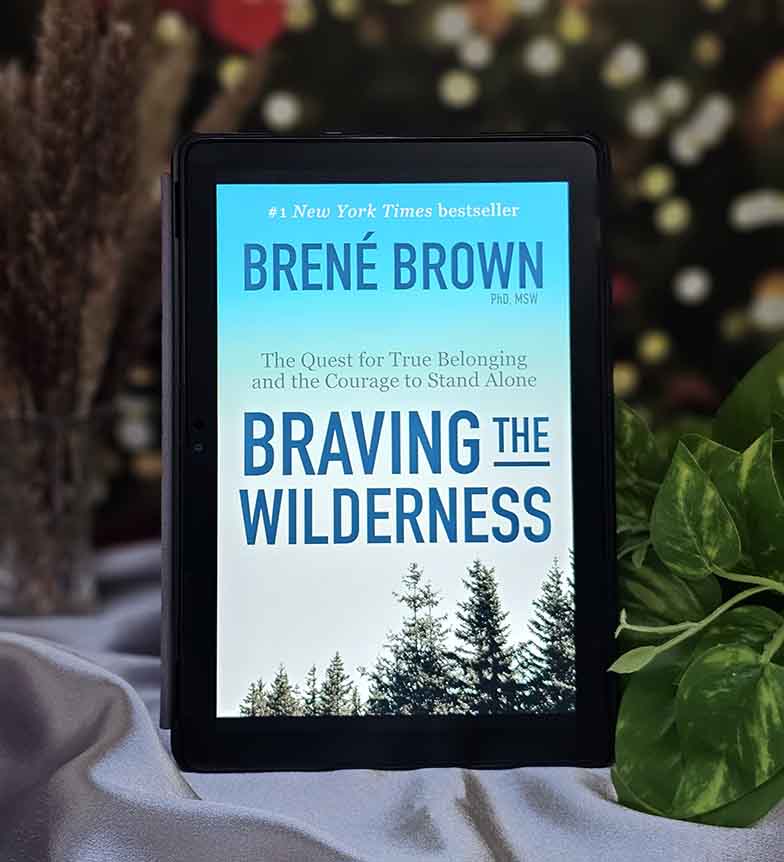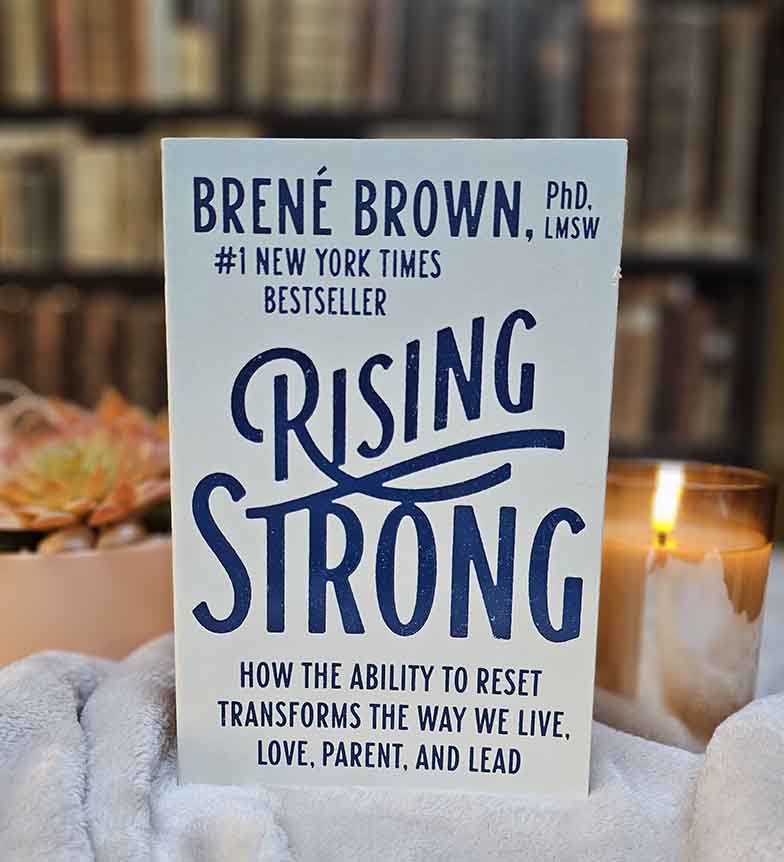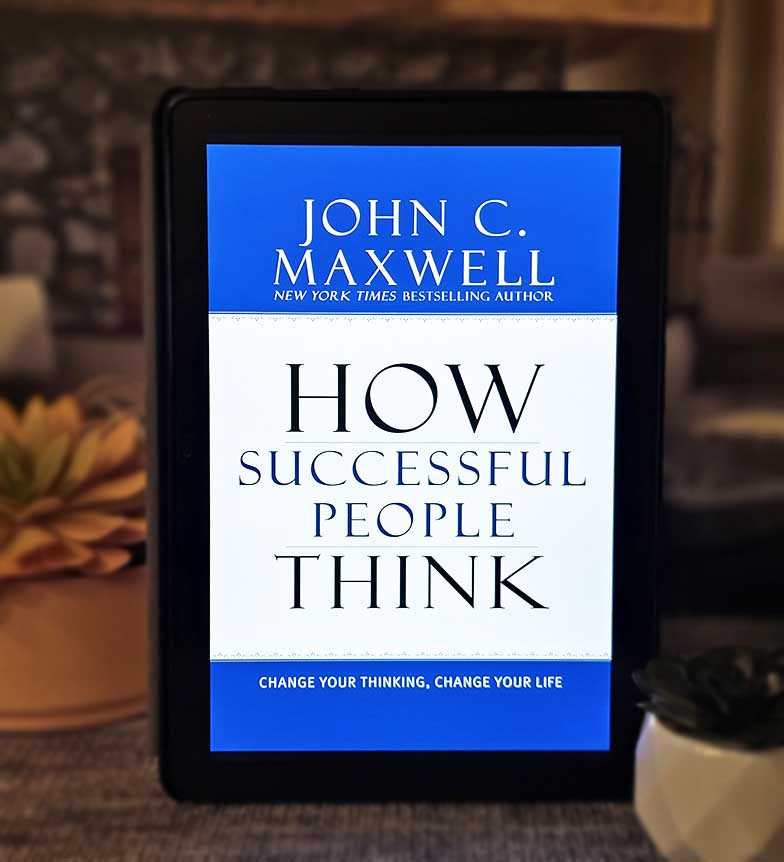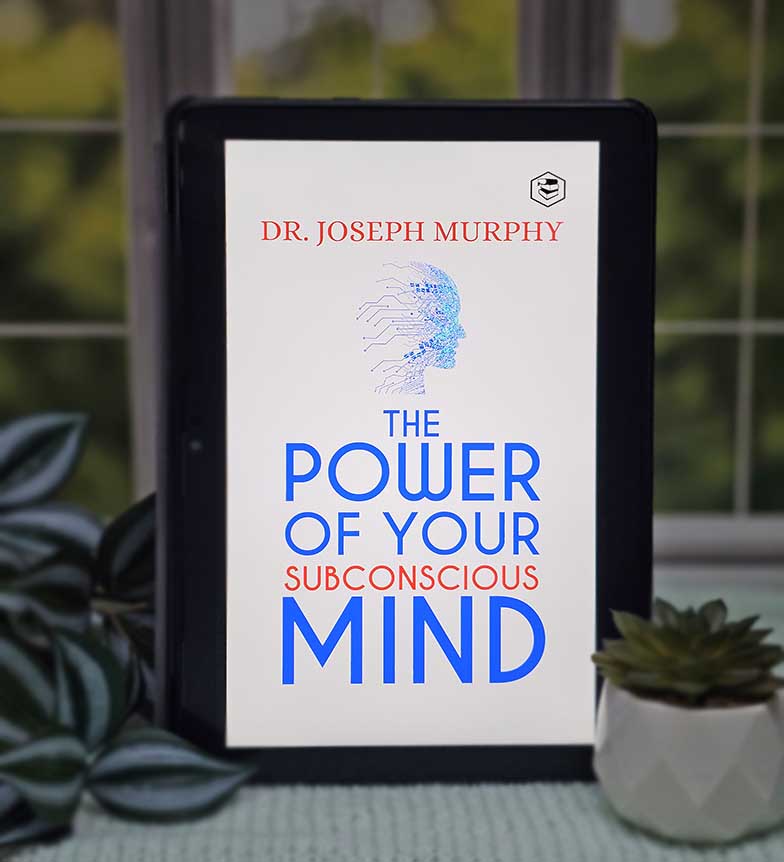
Braving the Wilderness
by Brené Brown
Brené Brown explores true belonging and the courage to stand alone, examining how we can maintain our authenticity and values even when it means standing apart from groups or popular opinion.
Spoiler Warning
This review may contain spoilers. Read at your own discretion if you haven't finished the book yet.
Standing Alone Together: Brené Brown's Guide to Authentic Belonging in a Divided World
Braving the Wilderness arrives at a crucial cultural moment when political polarization, social media echo chambers, and tribal thinking threaten both individual authenticity and social cohesion. Brené Brown's exploration of true belonging provides a research-based framework for maintaining personal integrity while building genuine connections across difference, offering hope for bridging divides that seem increasingly unbridgeable in contemporary society. This work represents Brown's most politically aware and socially urgent contribution to understanding human connection and courage.
Redefining Belonging: From Fitting In to Standing Up
The Distinction Between Fitting In and Belonging
Brown's central insight distinguishes between fitting in—changing ourselves to be accepted by others—and true belonging—being accepted for who we authentically are. This distinction becomes crucial in environments where group membership requires abandoning personal values or authentic self-expression.
The research reveals how the desire to fit in can lead to betraying our own values and beliefs, ultimately creating the very disconnection and loneliness we were trying to avoid through group membership.
Belonging to Yourself First
True belonging requires developing such a secure relationship with yourself that you can maintain your integrity even when standing alone becomes necessary. This internal foundation enables authentic connection with others because it eliminates the desperate need for approval that compromises genuine relationship.
Brown demonstrates how self-belonging becomes the prerequisite for healthy relationships and communities rather than a selfish alternative to them.
The Wilderness: Courage to Stand Alone
The Metaphor of Wilderness
Brown uses wilderness as metaphor for the experience of standing alone in your values and beliefs when they conflict with group pressure, family expectations, or cultural norms. This wilderness experience, while uncomfortable, becomes necessary for maintaining integrity and ultimately enables more authentic connection.
The wilderness represents not permanent isolation but temporary separation that allows for clarity about values and authentic self before reentering community from a place of strength rather than need.
Political and Social Applications
The book directly addresses how political polarization creates pressure to choose sides rather than think independently about complex issues. Brown provides framework for maintaining nuanced thinking and authentic positions even when they don't align with any particular political tribe.
This approach becomes increasingly relevant in environments where political identity has become total identity and where expressing disagreement with any aspect of group thinking can result in complete exclusion.
Building Bridges Across Difference
The Practice of Civil Disagreement
Brown provides concrete strategies for engaging with people who hold different views without abandoning your own principles or attacking theirs. This approach recognizes that democracy and healthy communities require the ability to disagree respectfully while maintaining relationship.
The emphasis on maintaining connection while expressing disagreement offers alternative to both aggressive confrontation and passive avoidance that characterize much contemporary political discourse.
Humanizing the Other
The principle "People are hard to hate close up" provides practical foundation for countering dehumanization and stereotyping that fuel political and social divisions. Brown demonstrates how personal connection can maintain humanity even across significant ideological differences.
This approach requires courage to engage with people as individuals rather than representatives of groups or ideologies, focusing on shared humanity while acknowledging real differences in values and beliefs.
Trust and Relationship Building
The BRAVING Inventory
Brown provides systematic framework for building and maintaining trust through seven key elements: Boundaries, Reliability, Accountability, Vault (confidentiality), Integrity, Nonjudgment, and Generosity. This inventory makes trust concrete and actionable rather than abstract feeling.
Each element includes specific behaviors and attitudes that either build or erode trust, giving readers practical tools for strengthening relationships across all areas of life.
Trust in Divided Times
The book addresses how political and social divisions affect trust within families, communities, and institutions, providing guidance for rebuilding trust relationships that have been damaged by political disagreement or social change.
Contemporary Social Challenges
Social Media and Echo Chambers
Brown addresses how digital technology can create false sense of belonging through echo chambers while actually increasing isolation and polarization. The book provides strategies for using technology in ways that support rather than undermine authentic connection.
The discussion of online behavior and digital relationships offers practical guidance for maintaining integrity and humanity in virtual interactions that often encourage dehumanization and tribal thinking.
Identity Politics and Authentic Identity
The book navigates the complex territory of group identity and individual authenticity, showing how we can honor important aspects of our identity—race, gender, sexuality, religion—while maintaining independent thought and authentic self-expression.
Brown demonstrates how true belonging allows for both group solidarity and individual integrity rather than requiring choice between them.
Cultural Change and Values Transmission
The exploration of how values are passed between generations and how cultures change while maintaining core principles provides framework for navigating rapid social transformation while preserving what matters most.
Practical Applications
Family and Personal Relationships
The book provides guidance for maintaining authentic relationships with family members and friends who may hold different political or social views, showing how love and connection can coexist with disagreement.
Professional and Workplace Applications
The principles apply to workplace dynamics where pressure for conformity can conflict with individual integrity and where diverse viewpoints need to coexist productively.
Community and Civic Engagement
Brown offers framework for participating in community and civic life in ways that build rather than divide, focusing on shared humanity and common concerns while acknowledging real differences.
Research Foundation and Credibility
Data-Driven Insights
The book grounds its recommendations in Brown's extensive research on belonging, shame, and vulnerability, providing evidence-based foundation for what might otherwise seem like common-sense advice.
Cross-Cultural and Diverse Perspectives
The research includes diverse populations and experiences, making the findings applicable across different cultural and social contexts while acknowledging variations in how belonging is experienced and expressed.
Writing Quality and Accessibility
Personal Narrative and Universal Themes
Brown skillfully integrates personal stories that illustrate universal themes without making the book primarily autobiographical, maintaining focus on insights that readers can apply to their own situations.
Practical Tools and Frameworks
The book provides specific tools—like the BRAVING inventory—that readers can immediately use to assess and improve their relationships and community connections.
Hopeful but Realistic Tone
Brown maintains optimistic perspective about human capacity for connection while acknowledging the real challenges and costs of maintaining authenticity and building bridges across difference.
Cultural Impact and Relevance
Political Healing and Democracy
The book contributes to discussions about how democracy can function in increasingly polarized environments, offering alternatives to both aggressive partisanship and disengaged cynicism.
Mental Health and Social Connection
The emphasis on authentic belonging addresses contemporary epidemics of loneliness and social isolation while providing actionable alternatives to superficial social media connection.
Leadership and Organizational Culture
The principles have influenced leadership development and organizational culture initiatives, contributing to environments that value both diversity and authentic expression.
Strengths and Unique Contributions
Integration of Personal and Political
Brown successfully integrates individual psychological development with broader social and political concerns, showing how personal growth and social healing can support each other.
Evidence-Based Hope
The book provides realistic optimism based on research about human capacity for connection and growth rather than naive assumptions about easy solutions to complex problems.
Practical Spirituality
The approach integrates spiritual dimensions of belonging and meaning without requiring specific religious beliefs, making it accessible to readers across different faith traditions and secular perspectives.
Areas for Further Development
Systemic and Structural Considerations
While the book addresses individual and relational aspects of belonging, it could benefit from more discussion of systemic and structural barriers that affect different groups' access to belonging and authentic self-expression.
Implementation Challenges
Some readers may need more specific guidance about how to maintain these practices over time, particularly when facing sustained pressure or conflict.
Cultural Context Variations
The framework may require adaptation for different cultural contexts where individualism and group belonging are balanced differently than in Western contexts.
Target Audience and Applications
General Personal Development
Anyone struggling with questions of identity, belonging, and authenticity will find research-based guidance and practical tools.
Political and Social Engagement
Readers interested in bridging political divides and building more inclusive communities will discover concrete strategies for maintaining integrity while building connection.
Leadership and Professional Development
Leaders and professionals working in diverse environments will find tools for building trust and navigating difference constructively.
Therapeutic and Educational Applications
Mental health professionals and educators can use Brown's framework to help others develop healthier approaches to belonging and relationship.
Final Assessment
Braving the Wilderness succeeds in addressing one of the most pressing challenges of our time—how to maintain authentic self while building genuine community in an increasingly polarized world. Brown's greatest achievement is demonstrating that individual integrity and social connection can reinforce rather than compete with each other when approached with courage and wisdom.
The book provides both personal guidance for navigating belonging challenges and social framework for building more inclusive communities that honor both diversity and shared humanity. Rather than offering simple solutions to complex problems, Brown provides tools that become more valuable as they are practiced and integrated over time.
This is essential reading for anyone seeking to live authentically while building meaningful relationships across difference, offering hope that genuine belonging and social healing remain possible even in divided times.
Rating: 5.0/5 ⭐
Perfect for: Anyone struggling with belonging and authenticity, people interested in bridging political divides, leaders seeking to build inclusive communities
Consider carefully if: You prefer purely individual focus without social/political dimensions, or vulnerability-based approaches don't resonate with you
My Notes & Takeaways
Core Concepts and Insights
True Belonging Defined: "True belonging is the spiritual practice of believing in and belonging to yourself so deeply that you can share your most authentic self with the world and find sacredness in both being a part of something and standing alone in the wilderness."
This definition reframes belonging as internal practice rather than external achievement, requiring self-acceptance before seeking acceptance from others.
The Wilderness Experience: "The wilderness is an untamed, unpredictable place of solitude and searching. It is a place as dangerous as it is breathtaking, a place as sought after as it is feared."
Brown uses wilderness metaphor to describe the experience of standing alone in your values and beliefs when they conflict with group pressure or popular opinion.
People Are Hard to Hate Close Up: "It's hard to hate people close up. Move in. Speak truth to bullshit. Be civil. Hold hands. With strangers."
This principle emphasizes how personal connection and proximity can counter dehumanization and political polarization.
BRAVING Inventory: The acronym BRAVING (Boundaries, Reliability, Accountability, Vault, Integrity, Nonjudgment, Generosity) provides framework for building and maintaining trust in relationships.
You Might Also Like

Rising Strong
by Brené Brown
Brené Brown explores the process of getting back up after failure, heartbreak, and disappointment, providing a research-based approach to resilience and emotional recovery.

How Successful People Think
by John C. Maxwell
John C. Maxwell explores eleven types of thinking that successful people use, offering strategies for developing better mental habits and decision-making skills.

The Power of Your Subconscious Mind
by Joseph Murphy
A classic self-help book exploring how the subconscious mind influences our lives and how we can harness its power to achieve success, health, and happiness through directed thought and belief.